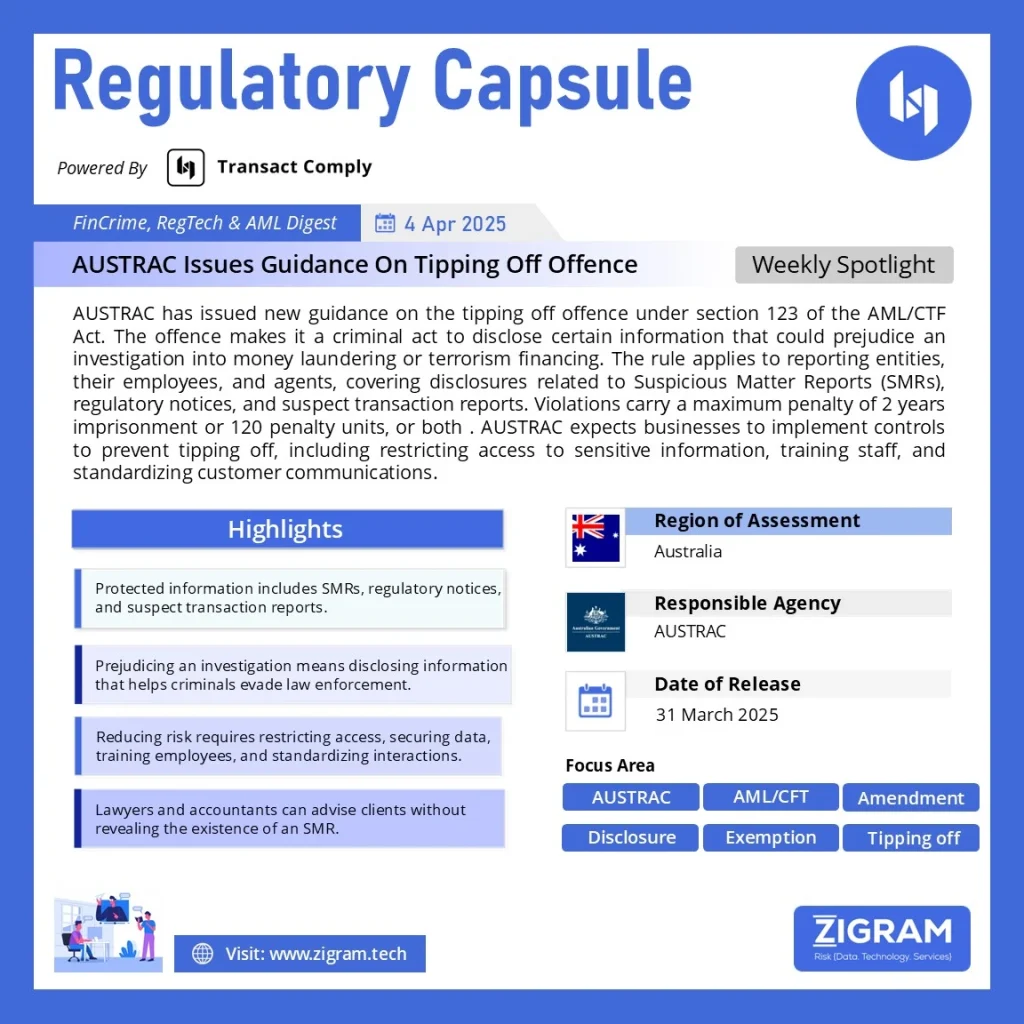Regulation Name: Tipping Off Offence Under Section 123 Of AML/CFT Law
Date Of Release: 31 March 2025
Region: Australia
Agency: AUSTRAC
Understanding the New Tipping Off Offence under Section 123 of the AML/CTF Act
Starting from 31 March 2025, a significant regulatory change will come into effect in Australia under Section 123 of the Anti-Money Laundering and Counter-Terrorism Financing Act 2006 (AML/CTF Act). This change introduces the criminal offence of tipping off, which prohibits the disclosure of certain types of information that could reasonably be expected to prejudice an investigation. The primary aim of this legislation is to ensure that criminals cannot evade law enforcement by being alerted to ongoing investigations.
What is Tipping Off?
Tipping off occurs when a person discloses information that:
• Relates to an ongoing or potential investigation under Commonwealth, State, or Territory law.
• Could help criminals alter their behavior to avoid detection.
Even if an individual is unaware of an ongoing investigation, they must be cautious when handling sensitive information that could later impact an investigation.
Penalties for tipping off include imprisonment for up to 2 years or a fine of 120 penalty units, or both.
Types of Information Protected Under the Tipping Off Offence
The law defines protected information broadly. The following categories are included:
1. Suspicious Matter Reports (SMRs):
o Confirmation that an SMR has been submitted.
o Any report prepared to fulfill SMR obligations.
o Documents summarizing or referring to information contained in an SMR.
2. Notices Issued Under Sections 49 and 49B of the AML/CTF Act:
o The requirement to produce documents or provide information.
o Confirmation that such information has been provided.
3. Suspect Transaction Reports (SUSTRs):
o Information linked to suspect transactions reported under the now-defunct Financial Transaction Reports Act 1988 (for entities active before 7 January 2025).
Who Does the Tipping Off Offence Apply To?
The tipping off offence applies to:
• Reporting entities (e.g., banks, financial institutions, casinos, and other businesses covered under AML/CTF laws).
• Officers, employees, and agents of reporting entities.
• Individuals required to provide information under Section 49 or 49B of the AML/CTF Act.
What Constitutes Prejudicing an Investigation?
Disclosures can prejudice an investigation if they:
• Inform a customer that their transactions or activities have been flagged as suspicious.
• Reveal to an associate of a suspect that an investigation is underway.
• Are publicly disclosed (e.g., through websites, news articles, or discussions with journalists).
Examples of Tipping Off:
• A bank employee telling a customer, “Your transaction was flagged as suspicious, and we need to report it.”
• Leaking information about an AML-related investigation to the media.
• An accountant informing a client that their financial activities are under scrutiny by AUSTRAC.
When is Disclosure Not Considered Tipping Off?
There are circumstances where sharing protected information is permissible, including:
• Legal Compliance: When disclosures are required under other laws, such as those preventing scams or addressing gambling regulations.
• Risk Management: Sharing data within a corporate group, AML consultants, auditors, or legal advisors to ensure AML/CTF compliance.
• Law Enforcement Cooperation: Reporting to Australian police, regulatory, and intelligence agencies such as the Australian Taxation Office (ATO), Australian Border Force (ABF), and the National Anti-Corruption Commission.
Reducing the Risk of Tipping Off
To ensure compliance, businesses should adopt strong internal controls, including:
1. Restricting Information Access: Limiting access to only those who require it.
2. De-identification of Data: Removing personal details when discussing case trends.
3. Audit Trails: Keeping logs of who accessed AML-related information.
4. Secure Document Handling: Using encryption, password protection, and secure disposal methods.
5. Employee Training: Conducting regular training programs on the tipping off offence.
Managing Customer Interactions Without Tipping Off
Handling customer interactions carefully is key to compliance. If further information is needed, businesses should provide general reasons, such as:
• “We are updating our records and need additional details.”
• “This is part of our routine compliance checks.”
• “We require further verification of your transaction for regulatory reasons.”
Ending a Business Relationship If an entity decides to terminate services with a customer, the reason should be framed in a non-suspicious manner:
• “Our company no longer offers services that align with your business activities.”
• “We have reassessed our risk appetite and have made strategic changes.”
• “Your response to our compliance requests was not satisfactory.”
Read the full guidance here.
Read about the product: Transact Comply
Empower your organization with ZIGRAM’s integrated RegTech solutions – Book a Demo
- #AML
- #Compliance
- #FinancialCrime
- #Regulations
- #TippingOff
- #AUSTRAC
- #RiskManagement
- #AntiMoneyLaundering
- #CTF
- #FinancialSecurity
